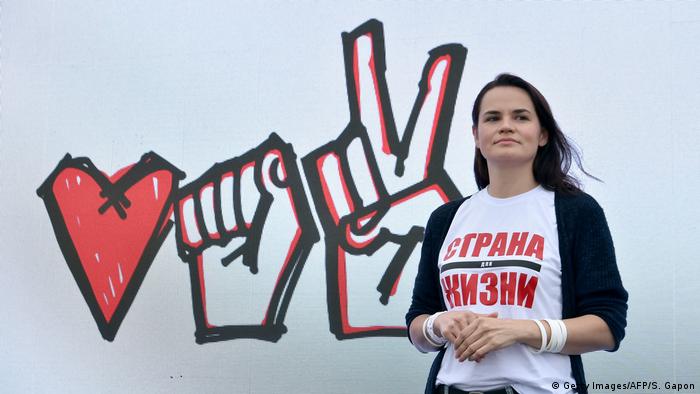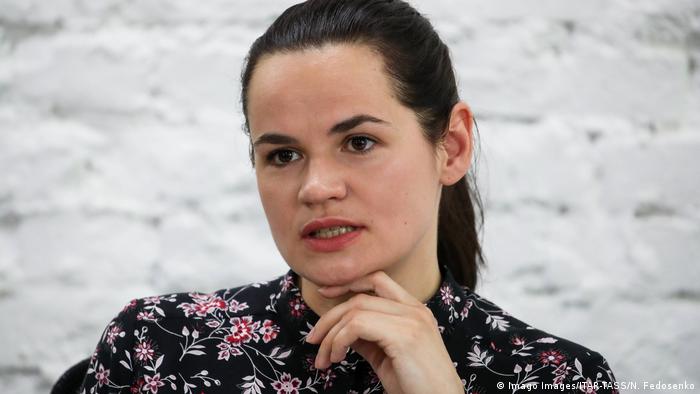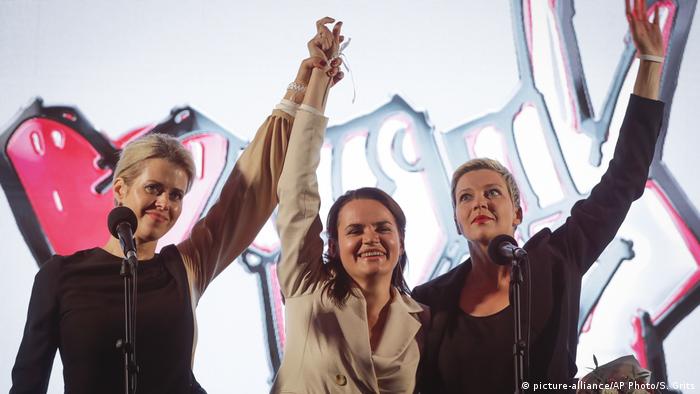Svetlana Tikhanovskaya: The teacher challenging Lukashenko — Europe's last dictator
Svetlana Tikhanovskaya, a teacher, is the greatest challenge yet to the reign of Alexander Lukashenko, who vies for a sixth term as Belarus' president. Svetlana Tikhanovskaya has had a staggering and unprecedented rise.
LOVE POWER PEACE/VICTORY

Svetlana Tikhanovskaya does not describe herself as a politician. Indeed, she says she just wants her family back and to be able to cook for them. Yet, for now, she is running for election, and observers consider the 37-year-old stay-at-home parent, a teacher and interpreter by profession, perhaps the greatest challenge yet to the reign of President Alexander Lukashenko, who is seeking a sixth term on Sunday.
Tikhanovskaya ended up in this position almost by chance. It was initially her husband, the 41-year-old video blogger Sergei Tikhanovsky, who wanted to challenge the president. However, he was arrested before the election campaign even kicked off and charged with taking part in an unauthorized demonstration at the beginning of the year.

Svetlana Tikhanovskaya does not describe herself as a politician. Indeed, she says she just wants her family back and to be able to cook for them. Yet, for now, she is running for election, and observers consider the 37-year-old stay-at-home parent, a teacher and interpreter by profession, perhaps the greatest challenge yet to the reign of President Alexander Lukashenko, who is seeking a sixth term on Sunday.
Tikhanovskaya ended up in this position almost by chance. It was initially her husband, the 41-year-old video blogger Sergei Tikhanovsky, who wanted to challenge the president. However, he was arrested before the election campaign even kicked off and charged with taking part in an unauthorized demonstration at the beginning of the year.

Svetlana Tikhanovskaya eyes an end to Lukashenko's grip on power
Read more: Anti-government protesters rally ahead of Belarus vote
When Tikhanovsky was formally disqualified, Tikhanovskaya decided to run instead. And, surprisingly, she was able to collect the 100,000 required signatures and made the ballot. After her husband was released, he ran her campaign for a few days before being arrested again. He is currently in detention and accused of violence against the police. His supporters say that he was provoked.
Read more: Tikhanovskaya challenges Lukashenko's power in Belarus vote
An inauspicious start
Tikhanovskaya, who is from a small southwestern town, studied foreign languages before going on to work as a translator in Gomel, the second-biggest city in Belarus. This is where she met her husband, with whom she has two children. She stopped working to look after her family. Though she says she was never interested in politics, she says that she learned a lot about her country and its inhabitants traveling with her husband. He had to travel a lot for a video blog that he launched on YouTube at the beginning of 2019.
Read more: Belarus blocks Lukashenko's rival Babariko from presidential vote
It's the first time that such an outsider has taken part in the authoritarian country's electoral process. It's almost as if an amateur runner were suddenly in a position to win the Olympics. However, in this case, Tikhanovskaya could be excluded at any time. So far, however, she is still in the race and the preparations have gone so well that she is considered one of the favorites. Her election campaign team was boosted by support from two political heavyweights: the former banker Viktor Babariko and the former diplomat Valery Tsepkalo, who were also barred from running.
Tens of thousands of people have turned up to Tikhanovskaya's rallies — breaking records in a country where people have long been discouraged from taking part in politics and tend to be either dispassionate or scared. Tikhanovskaya's election program is rudimentary, but she has a few clear goals: Belarusian independence and the release of all political prisoners, including her husband. If she wins, she has pledged to hold free elections within six months later so that currently barred opposition candidates can run and she can return to raising her family.
Read more: Lukashenko accuses Russian mercenaries, critics of plotting attack
An unusual approach
It is clear that Tikhanovskaya is an unusual candidate with an unusual approach to the task at hand. At the beginning she came across as unsure, but honest and this went down well. The more used to her role she became, the more her self-confidence grew. She was not afraid of saying that she did not have all the answers and admitted that she was no expert regarding foreign policy or economic reform.
Tikhanovskaya has avoided controversial subjects, but she has not allowed the president to bully her with his frequent attacks. When he said that someone who had not served in the army could not be head of state, she responded with the suggestion that only mothers should be allowed to run. Though she refuses to be intimidated, she did send her children abroad after an anonymous threat.
The campaign is a sign that Belarus is changing. Tikhanovskaya success has come as a surprise to many in a country that has been under the president's control for 26 years. People want to see a new face at the top — and it almost doesn't matter whose.
Read more: Lukashenko is playing games to keep his grip on power
At the moment, however, it looks like Lukashenko still has the advantage. Once again, there will be no independent election observers. The Organization for Security and Co-operation in Europe has not been invited.
Belarus elections: Lukashenko's authoritarian grip faces test
Alexander Lukashenko is seeing his dominance challenged in an election campaign that has held several surprises. Svetlana Tikhanovskaya's campaign has given the opposition in Belarus a clear female profile

It has been a long time since a presidential election in Belarus promised to be as exciting as the vote scheduled for Sunday. Initially, the election looked as if it would be a routine victory for the authoritarian incumbent, Alexander Lukashenko, who has ruled the former Soviet republic on the European Union's eastern border since 1994.
The 65-year-old former director of a large Soviet agricultural enterprise, Lukashenko is the longest-serving president in Europe. EU media refer to him as "Europe's last dictator."
The 2020 election campaign has not turned out the way Lukashenko likely expected. In just a matter of weeks, Svetlana Tikhanovskaya, a 37-year-old teacher and interpreter and the wife of the imprisoned blogger and activist Sergei Tikhanovsky, has become a symbolic figure for Lukashenko's opponents. When her husband, whom Amnesty International describes as a "prisoner of conscience," was not permitted to run in the election, Tikhanovskaya entered the race — and tens of thousands of people attended her rallies. "I'm tired of being silent," she said at a rally in the capital, Minsk, at the end of July.
Read more: Lukashenko is playing games to keep his grip on power
An emerging opposition
Unlike in neighboring Ukraine, people in Belarus were long thought of as politically passive by international observers, partly thanks to Lukashenko's relatively successful economic policies, which benefited from close ties with Russia. In the past years, however, there have been repeated disputes with Moscow over energy shipments.
Now, people's willingness to protest seems to have increased. Voters stood in long lines to give their signatures in support of opposition candidates, as required under Belarusian election law, and they took to the streets in nationwide protests when candidates were arrested.
Leaders of the nationalist opposition parties, who have fought Lukashenko without success for years, were unable to agree on a candidate. Some of them have been arrested.
One of the new social phenomena associated with this election is the involvement of the urban middle class, which had tended to steer clear of public political statements. Perhaps this was one of the reasons why two representatives of the ruling elite announced that they, too, wanted to run for president: Viktor Babariko, the longtime head of Belgazprombank — a subsidiary of the Russian energy giant Gazprom — and Valery Tsepkalo, a former diplomat and the founder of Belarus Hi-Tech Park.

Tikhanovskaya has become a symbol of the opposition in Belarus
The willingness of these two men to challenge Lukashenko was one of this campaign's biggest surprises. They did not get far and were not admitted as candidates on procedural grounds. Babariko was accused of economic crimes and arrested and remains in custody, and Tsepkalo left for Russia with his family.
The fact that Babariko and Tsepkalo's campaigns, led by young women, joined Tikhanovskaya's has given the opposition in Belarus a clear female profile. Women have been showing up for rallies to put an end to Lukashenko's presidency. Two of the five candidates on Sunday's ballot are women.
With no independent polling, it is hard to say how much of a challenge Tikhanovskaya will pose for Lukashenko. State media claim that Lukashenko has the support of about 70% of Belarusians. Some opposition politicians and media report that the president's approval rating is, in fact, in the single-digit range.
The coronavirus campaign
Many of the approximately 9.5 million Belarusians have been angry about how the state has dealt with the pandemic. As the novel coronavirus spread in Belarus, Lukashenko ignored it.
The president recommended vodka and sauna visits as protective measures. Lukashenko refused to impose a lockdown.
At the end of July, Lukashenko admitted that he had contracted COVID-19. The president's opponents, who had taken the problem seriously from early on, had worn masks and kept their distance. .
Belarus opposition hosts largest rally in a decade
Where is Russia?
In previous presidential elections in Belarus, there was a geopolitical division of roles: Lukashenko advocated closer ties to Russia, while the opposition urged better relations with the European Union. That division is not as pronounced ahead of the current election. Relations with Russia have been tense for months — partly because Lukashenko himself has balked at a still closer integration between the countries.

Lukashenko's strained ties with Putin have raised questions over his ability to hold onto power
The president has accused Russia of interfering in past election campaigns and supporting opposition candidates. Just days before Sunday's election, news of the arrest of 33 Russians accused by Belarusian authorities of being "mercenaries" with a private Russian combat squad caused a stir. Belarus accuses them of plotting mass unrest, which Russia has denied.
Read more: Journalists under pressure in Belarus as Lukashenko runs for presidency
It is unlikely that Lukashenko will lose the election — but it no longer seems impossible. The head of state has never shied away from holding on to power by force. Protests after the 2010 presidential election were brutally suppressed and opposition leaders arrested.
Back then, the United States and EU reacted with sanctions that were left in place until just a few years ago. Now history may repeat itself. Some observers fear the emergence of a police state.
The future of Belarus will become apparent after Sunday's election whether and how much he has changed in that regard.


No comments:
Post a Comment